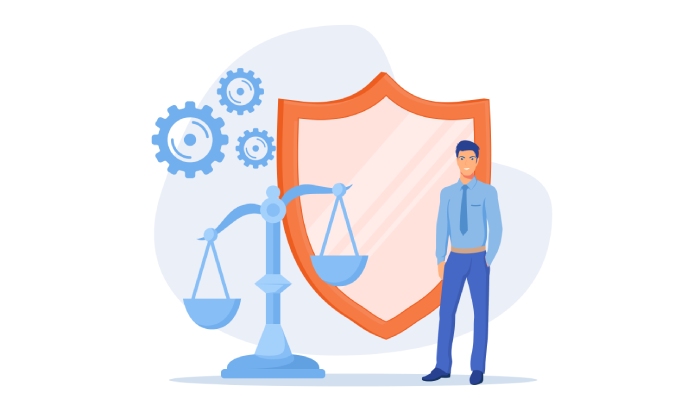Every business faces risk. A lawsuit, a contract dispute, or poor financial management can threaten its survival. Without proper protection, owners may lose assets or struggle to recover from legal and financial setbacks.
Taking proactive steps reduces these risks. Choosing the right legal structure limits liability. Keeping business and personal finances separate prevents legal complications. Securing written contracts protects against disputes. Each decision strengthens the business and ensures long-term stability.
Protection requires action. Establish clear policies. Follow legal requirements. Use strong financial controls. A well-protected business can withstand challenges and continue to grow. We’ll show you how.
Start an LLC
Forming a Limited Liability Company (LLC) shields business owners from personal financial and legal risks. It establishes a legal separation between personal and business assets, ensuring that owners are not personally responsible for company debts or lawsuits.
If the business faces legal action, creditors can only pursue assets owned by the LLC—not the owner’s home, savings, or personal property.
This protection is strongest when the LLC follows legal formalities. One of the key steps is to create an LLC Operating Agreement, which outlines ownership structure, member responsibilities, and operating procedures. Owners must maintain separate bank accounts, keep detailed records, and avoid personal guarantees on business debts. Failure to do so may result in “piercing the corporate veil,” where courts hold owners personally liable.
Where to Start an LLC?
An LLC provides more privacy benefits in states like Wyoming, which allow anonymous ownership. This prevents business owners’ personal information from being on public record when formed correctly. Wyoming is one of the few states that allow this.
Wyoming LLC formation is best when done with an attorney. Wyoming has strong legal protections for both single and multi-member LLCs. It’s the most popular state for online businesses and small business owners to form an LLC.
Separate Your Personal and Business Activities
Maintaining a clear distinction between business and personal activities is important for protecting both the business entity and the owner’s personal assets.
Mixing personal and business finances weakens liability protections, increases tax risks, and complicates legal compliance.
When an LLC owner uses personal accounts for business transactions, courts may disregard the LLC’s liability shield in a legal dispute.
To prevent this, business owners should:
- Open a dedicated business bank account.
- Use a separate business credit card.
- Maintain detailed financial records.
- Sign contracts in the LLC’s name.
Proper separation also strengthens tax compliance. The IRS scrutinizes mixed finances, and mixing funds can lead to tax audits, deductions being denied, or the reclassification of business income as personal income.
By keeping financial activities distinct, business owners preserve their LLC’s legal protections.
Register a Trademark
While trademark rights begin when you first use the mark commercially, federal registration provides stronger legal protection.
Start by determining which elements of your brand require federal protection. Your main company name (house mark) should be registered first, while secondary brands can be tested in the market before registration.
Operating without trademark registration leaves your brand vulnerable to infringement. Use the TM symbol on unregistered marks during the application process. Reserve the ® symbol exclusively for marks that complete registration.
Follow these steps:
- Conduct a thorough trademark search
- File your application with the USPTO
- Monitor application status
- Respond promptly to office actions
- Maintain registration through proper use and renewals
Consult a Tax Professional
Choose a qualified tax professional to protect your business finances. A Certified Public Accountant (CPA) will ensure proper tax compliance while identifying valuable deductions and credits.
Select someone with proven experience in your industry sector. Your tax advisor must demonstrate knowledge of local, state, and federal regulations that apply to your business.
Begin tax planning early and meet regularly with your advisor. Schedule quarterly reviews to assess your tax position and implement strategic adjustments.
Invest in Cybersecurity
Train all staff members in cybersecurity best practices. Establish mandatory security awareness programs that teach employees to identify phishing attempts and follow strict security procedures.
Select email service providers offering backup mail exchange servers and secure message routing to maintain operations during system outages. Incorporate a VPN Google Extension to safeguard data when accessing sensitive information online.
Deploy advanced email security measures immediately. Install real-time URL scanning tools to detect and block malicious links before they reach employee inboxes. Use DuoCirlce to configure proper email authentication protocols, including SPF and DMARC, to prevent email spoofing and ensure reliable message delivery.
Monitor cyber threats continuously. Track emerging risks, including malware infections, ransomware attacks, and unauthorized data access attempts. Update all security systems weekly to patch vulnerabilities and strengthen defense mechanisms. Implement automated scanning tools to detect system weaknesses before attackers exploit them.
Create detailed incident response plans. Document step-by-step procedures for handling security breaches, including communication protocols and recovery processes. Review and update these plans quarterly to address new threat patterns.
Consider Business Insurance
Protect your business with comprehensive insurance coverage—no security measure alone can shield against all risks. Purchase general liability insurance first to defend against basic claims like customer injuries and property damage.
Identify and secure coverage for your specific industry risks. Professional liability insurance protects against negligence claims, while property insurance safeguards your physical assets from disasters like fires and theft. Install business interruption coverage to maintain income during recovery periods after unexpected events.
Conduct annual insurance reviews to maintain adequate coverage levels. Assess your policies whenever you acquire new assets, expand operations, or enter new markets. Calculate potential losses to determine appropriate coverage amounts. Select reputable insurers with strong financial ratings and clear claim processes.
Hire a Bookeeper
A bookkeeper acts as your financial manager by tracking all money movements, handling payments, and maintaining tax records.
Before hiring, verify these critical qualifications:
- Certified Bookkeeper (CB) designation
- Industry-specific experience
- Strong references from similar businesses
- Knowledge of current accounting software
Take action early in your business operations. Don’t postpone hiring until tax problems or financial issues emerge. Your bookkeeper must perform these core functions:
- Monitor daily financial transactions
- Manage accounts payable and receivable
- Ensure compliance with tax regulations
- Create detailed financial reports
- Track cash flow patterns
Consider bookkeeping costs as an investment in your business’s financial health. Select a professional who understands your industry and demonstrates attention to detail. Establish clear communication channels and reporting schedules from the start.
Have an Attorney Ready
Select a qualified business attorney before legal challenges emerge. This proactive step forms part of your risk management strategy. Don’t delay until facing a lawsuit or dispute to find legal representation.
Take these specific actions to secure proper legal counsel:
- Research attorneys who specialize in your industry sector
- Request referrals from other business owners
- Contact your local bar association for recommendations
- Schedule consultations with potential attorneys
Focus your search on attorneys with direct experience in your business field. Avoid general practice lawyers who lack specialized knowledge of your industry. Meet with several candidates before making your final selection.
Preventative legal counsel requires an investment but it costs less than defending lawsuits or paying regulatory fines. Attorney consultation helps identify potential issues before they become serious problems.
Make legal guidance a standard part of your business operations to maintain proper protection and compliance.


